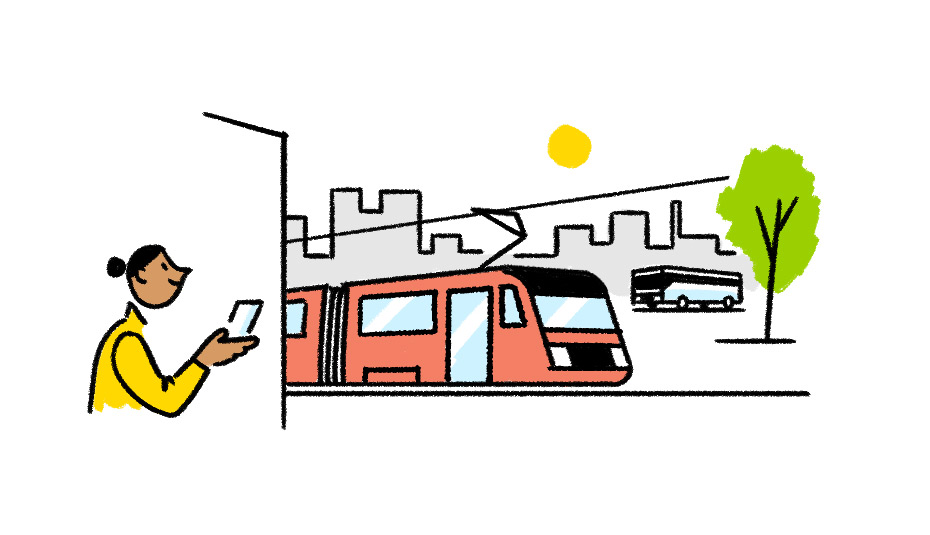Survey: Many Niemenranta residents do not need a car, while Lentävänniemi residents favour local and seasonal food
In the survey, residents were asked about issues related to services and lifestyles under the following themes: housing, mobility, food, energy and civic participation. The survey was carried out in December 2023, with 439 residents from Lentävänniemi, Reuharinniemi, Niemenranta and the Halkoniemi harbour area responding.
The survey is a part of the Carbon Neutral Actions development programme, which provides incentives for sustainable mobility and consumption choices in various residential areas in Tampere.
– Lentävänniemi-Niemenranta will be the fourth target area included in the programme, because we wanted to include an area serviced by a tramline. The recent investigation and survey will help us take the special characteristics of residential areas and the experiences of residents into consideration. At the same time, we were able to gather information on the potential of new solutions. This allows us to support sustainable everyday living from a genuinely local perspective, says Programme Manager Tiina Leinonen.
The various areas are united in how much they value the local nature
There are significant differences between Niemenranta and Lentävänniemi. Niemenranta is a relatively new residential area, where the majority of people live in apartment blocks built in the 2000s. In Lentävänniemi, on the other hand, almost half of the residents live in houses built in the 1970s or earlier. Energy solutions, for example, are a timely consideration in this area.
The two areas share a concern about the state of nature and an appreciation for small, everyday joys and experiences. Residents of both areas also view children's hobbies as important.
Public transportation is seen as effective. As many as 45 per cent of Niemenranta’s residents say that they do not consider a car to be necessary for themselves or their family. On the other hand, Lentävänniemi’s more remote location and fewer services increase the need for a car.
80 per cent of respondents believe that the tram, which will begin operating at the start of 2025, will improve the area’s public transport services. In Niemenranta, the attitude towards the tram is slightly more positive than in Lentävänniemi. There is concern in both residential areas about the deteriorating conditions of travel to Lielahti. Residents hope that visiting Lielahti by bike or walking will be made easier.
In Niemenranta, environmental concerns are a factor in the daily consumption choices of many respondents. As many as 78 per cent of respondents feel that they would like to spend more responsibly, but most often the price is the deciding factor. For example, many respondents say that they have adopted a more plant-based diet. On the other hand, Lentävänniemi residents have more reservations when it comes to vegetarian food. However, they are no strangers to local and seasonal food. Older residents in particular are forerunners in sustainable eating habits.
Both of the residential areas consider new solutions that support sustainable everyday life interesting. In particular, this applies to the rental and shared use of goods. Residents in Niemenranta are also interested in, for example, monitoring energy consumption with smart solutions.

Tampere residents more interested than average in sustainable consumption
A similar investigation and survey was carried out in Tesoma, Ikuri, Tohloppi and Rahola, Vuores, Leinola and Vehmainen in spring 2023.
The residents of all four target areas have a fairly positive attitude towards ecological actions and sustainability. A clear majority (80 per cent) believe that sustainable choices made by regular citizens are important.
Local nature and its preservation, along with physical activity and its effect on maintaining health, are also considered important in every target area. The most common sustainable actions in all of the target areas are walking or cycling short distances, minimising energy consumption and the purchase of second-hand goods.
Respondents believe that the biggest obstacles to a sustainable lifestyle are money and a lack thereof as well as the hectic pace of everyday life. Health concerns and scepticism towards the effectiveness of one's own actions also impede sustainable choices.
The data gathered during the survey will be used in planning actions and services that support sustainable everyday living. Practices that are found to be effective can later be promoted more extensively throughout the city.



